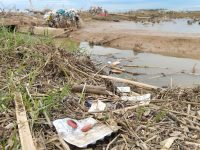This is a decisive decade in the fight against climate change, both in terms of mitigation and adaptation policies. The evidence of the effects of the current global warming process, most evident in the Mediterranean basin, demands swift action. And we should no longer waste time listening to the unscientific claims of climate denialism. They play a different game: ignorance. In his essay Losing Earth: A recent history, on US climate change policy, Nathaniel Rich rightly laments that the 1980s were a lost decade for climate change mitigation in the American decision-making process. Scientific reports accumulated on the effects of the presence of carbon dioxide in the Earth’s atmosphere, but the US administration ignored them. We are now experiencing the consequences all over the world.
«Climate change will be the main policy focus in the coming years: there is no time to lose»
The third decade of the 21st century has all the ingredients to become the years of effective change in policies and measures to reduce greenhouse gas emissions and the preparation of territories and economic activities for the consequences that climate change will cause in the different regions of the world. The objectives are well established: meeting the Sustainable Development Goals and reducing emissions in the countries of the European Union (as set out in the 2030 Framework on Climate and Energy, at least within 40% of the 1990 levels). In addition to this, there are state and autonomous community regulations on climate change and energy transition, which establish specific mitigation and adaptation actions. All of this entails profound economic and social behaviour changes that require a budget and education efforts.
European reconstruction funds, within the framework of the European Green Deal, should be geared primarily towards achieving these objectives. Climate change will be the main policy focus in the coming years. If we understand the current warming problem as an opportunity to change the relationship between humans and the Earth, there is no time to lose. In Spain we are already witnessing the first manifestations of a process of atmospheric warming that is transforming our country’s climates. Four already scientifically proven processes are giving rise to what we can call a «Mediterraneanisation» of climate change in Spain: the alteration of the planetary energy balance due to the increasing presence of greenhouse gases, which causes a thermal stress on the Earth’s troposphere; the modification that this atmospheric warming is producing in atmospheric circulation, with more frequent manifestations of extreme events; the warming of Mediterranean waters, which since 1980 has doubled the rate of air warming; and the loss of thermal comfort – a notable increase in warm nights – and disturbances in rainfall regularity.
These latter aspects require significant changes in hydrological, economic, and territorial planning. The first must focus on managing water demand rather than its supply, which will become scarcer. The second involves most notably agriculture and tourism, the two activities most exposed to the effects of climate change. And the third implies that territories, and especially cities, must be planned under the assumptions of sustainability and adaptation to climate change. Examples of good practices in mitigation and adaptation at local scales are beginning to emerge around the world. In Spain, the Basque Country, Catalonia, and the Valencian Community stand out as regions that have made a firm commitment to action against climate change as a cross-cutting policy involving all government actions.
This must be the decade of climate action. So far, the data are not at all favourable. The latest UN report on the state of the Paris Agreement – published in February 2021 – clearly states that, if current greenhouse gas emissions continue as they are, they will still be 2% higher in 2025 than the base year (1990). In April this year, the proportion of CO2 in the Earth’s atmosphere set a new record. There is no time to lose.





